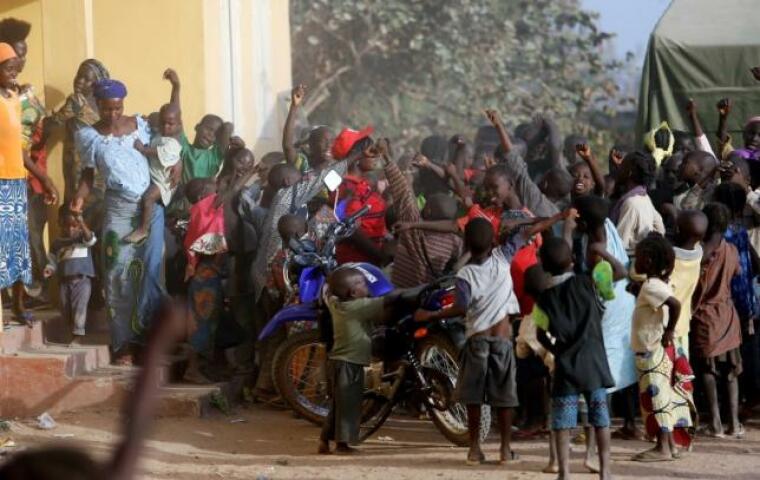UNICEF: 134 malnourished children die every day in humanitarian crisis caused by Boko Haram attacks in Nigeria
The United Nations Children's Emergency Fund (UNICEF) urged to scale up humanitarian support as 134 Nigerian children can die daily from acute malnutrition after Boko Haram unleashed its violence.

The humanitarian organization revealed the devastating picture after visiting the Borno state in northeast Nigeria where about one out of five or 49,000 children of the 244,000 severely malnourished can die if left untreated.
"Some 134 children on average will die every day from causes linked to acute malnutrition if the response is not scaled up quickly," said UNICEF Regional Director for Western and Central Africa, Manuel Fontaine.
Médecins Sans Frontières (MSF), an international medical humanitarian organization that provides free health care and shelter for the internally displaced in Nigeria, also reported a bleak picture last month after visiting on foot the refugee camp in Bama.
MSF said they found 1,233 graves of those who died of starvation, including children. It also described a health crisis where 19 percent of more than 800 children examined showed signs of severe acute malnutrition.
Fontaine warned that the real state of devastation may yet to be reported as there are still affected areas that remain unreached by humanitarian groups.
"There are 2 million people we are still not able to reach in Borno state, which means that the true scope of this crisis has yet to be revealed to the world,"
So far, the agency only accumulated 41 percent or $23 million out of the $55.5 million needed for humanitarian aid in the region. Fontaine appealed to partners and donors for more help to save the children from dying.
"We need all partners and donors to step forward to prevent any more children from dying," he said. "No one can take on a crisis of this scale alone."
"We must all scale up," added Fontaine.
Boko Haram militant group reportedly killed more than 20,000 people and displaced 2.7 million since its insurgency in 2009.
 Christians don't have to affirm transgenderism, but they can’t express that view at work: tribunal
Christians don't have to affirm transgenderism, but they can’t express that view at work: tribunal Archaeology discovery: Medieval Christian prayer beads found on Holy Island
Archaeology discovery: Medieval Christian prayer beads found on Holy Island Presbyterian Church in America votes to leave National Association of Evangelicals
Presbyterian Church in America votes to leave National Association of Evangelicals Over 50 killed in 'vile and satanic' attack at Nigerian church on Pentecost Sunday
Over 50 killed in 'vile and satanic' attack at Nigerian church on Pentecost Sunday Ukrainian Orthodox Church severs ties with Moscow over Patriarch Kirill's support for Putin's war
Ukrainian Orthodox Church severs ties with Moscow over Patriarch Kirill's support for Putin's war Islamic State kills 20 Nigerian Christians as revenge for US airstrike
Islamic State kills 20 Nigerian Christians as revenge for US airstrike Man who served 33 years in prison for murder leads inmates to Christ
Man who served 33 years in prison for murder leads inmates to Christ


 Nigerian student beaten to death, body burned over ‘blasphemous’ WhatsApp message
Nigerian student beaten to death, body burned over ‘blasphemous’ WhatsApp message 'A new low': World reacts after Hong Kong arrests 90-year-old Cardinal Joseph Zen
'A new low': World reacts after Hong Kong arrests 90-year-old Cardinal Joseph Zen Iran sentences Christian man to 10 years in prison for hosting house church worship gathering
Iran sentences Christian man to 10 years in prison for hosting house church worship gathering French Guyana: Pastor shot dead, church set on fire after meeting delegation of Evangelicals
French Guyana: Pastor shot dead, church set on fire after meeting delegation of Evangelicals ‘Talking Jesus’ report finds only 6% of UK adults identify as practicing Christians
‘Talking Jesus’ report finds only 6% of UK adults identify as practicing Christians Mission Eurasia ministry center blown up in Ukraine, hundreds of Bibles destroyed: 'God will provide'
Mission Eurasia ministry center blown up in Ukraine, hundreds of Bibles destroyed: 'God will provide' Church holds service for first time after ISIS desecrated it 8 years ago
Church holds service for first time after ISIS desecrated it 8 years ago Burger King apologizes for 'offensive campaign' using Jesus' words at the Last Supper
Burger King apologizes for 'offensive campaign' using Jesus' words at the Last Supper Uganda: Muslims abduct teacher, burn him inside mosque for praying in Christ’s name
Uganda: Muslims abduct teacher, burn him inside mosque for praying in Christ’s name